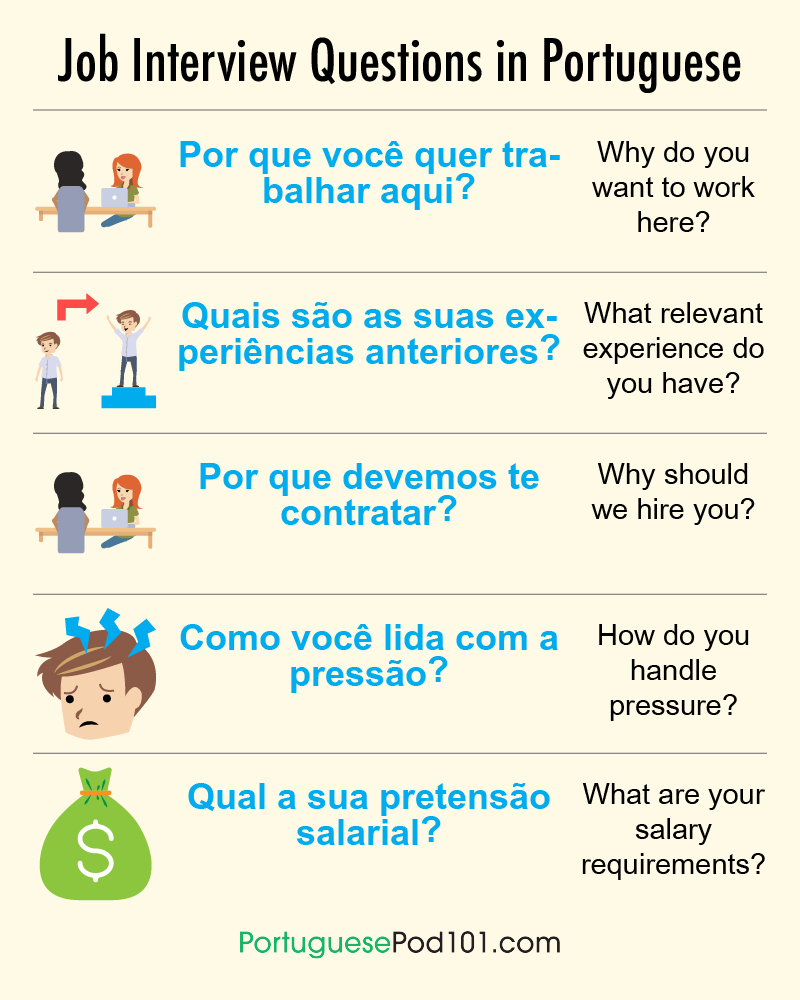
When it comes to conducting business, knowing the everyday vocabulary might not be enough. There are plenty of situation-specific sentences, words, and greetings that you should become familiar with in order to create an amazing first impression and navigate professional relationships. So whether you’re keen on working in Brazil or you have a business trip lined up soon, it will be very helpful to master some Portuguese business phrases.
Fortunately, things won’t get overly complicated in this article! You don’t have to worry about learning complex ways of addressing people or memorizing huge lists of vocabulary that you’ll rarely use. We’ll focus on introducing handy vocabulary for different situations and helping you understand some of the most commonly used sentences in work or business contexts. From job interviews to work trips and interactions with colleagues, we’ll cover it all.
With this guide, you’ll be able to avoid many of the embarrassing situations that result from communication misunderstandings, and you’ll soon be comfortable dealing with all of the dynamic challenges that arise in your professional life. Ready to dive right in?
 Table of Contents
Table of Contents
- Getting the Job
- Interacting with Coworkers
- In a Meeting
- Business Phone Calls and Emails
- Business Trips
- Continue Learning Portuguese with PortuguesePod101
1. Getting the Job

Let’s start with the step that comes before the actual work. Getting the job pretty much always requires a job interview, a situation that’s already quite stressful by nature. We hope that, with our list of useful Portuguese for business interviews, you’ll be able to relax on the language front and focus on showcasing your strengths!
First, let’s go over some useful words related to job interviews:
- Entrevista de trabalho/emprego (“Job interview”)
- Candidatura (“Application”)
- Perguntas (“Questions”)
- Respostas (“Answers”)
- Trabalhar (“To work”)
- Estudar (“To study”)
- Formar / Graduar (“To graduate”)
- Oportunidade (“Opportunity”)
- Qualidades (“Qualities”)
- Pontos fortes (“Strengths”)
- Defeitos (“Faults”)
- Pontos fracos (“Weaknesses”)
First of all, congratulations on getting an interview! Once you arrive at the place of the interview, the first thing you should do is greet the interviewer with a handshake and the customary greeting sentences in Portuguese.
- Olá, bom dia. (“Hello, good morning.”)
- Olá, boa tarde. (“Hello, good afternoon.”)
- Olá, boa noite. (“Hello, good evening.”)
It’s also polite to ask how the other person is, in a more formal way.
- Como está? / Como vai? (“How are you?”)
Next, introduce yourself. The interviewer will probably address you by your name in their greeting, but in case they don’t know how to address you, make sure to say it.
- Muito prazer, meu nome é [nome]. (“Nice to meet you, my name is [name].”)
One of the first things that comes up in a job interview is your previous academic and professional experience. Here, you can talk about what you studied, when you graduated, where you’ve worked, and what kind of tasks you’ve performed!
- Eu estudei Engenharia Química na Universidade X. (“I studied Chemical Engineering at X University.”)
- Eu me formei em 2019. (“I graduated in 2019.”)
- Tenho um mestrado em Marketing. (“I have a Master’s degree in Marketing.”)
- Trabalhei na empresa X por 2 anos, como coordenador de Recursos Humanos. (“I worked in the company X for two years, as a Human Resources coordinator.”)
- Minha função era coordenar os funcionários. (“My role was coordinating the employees.”)
Also take the opportunity to showcase your strengths and accomplishments!
- Minha maior qualidade é a dedicação à equipe. (“My biggest quality is dedication to the team.”)
- No meu último trabalho, consegui resolver desafios na área de marketing. (“In my last job, I solved challenges in Marketing.”)
- No meu último emprego, tive a oportunidade de aprender novas técnicas. (“In my last job, I had the opportunity to learn new techniques.”)
The interviewer may also ask you to talk about both your strong and weak points:
- Quais são seus pontos fortes e seus pontos fracos? (“What are your strengths and weaknesses?”)
- Meus pontos fortes são a organização e ambição. Meus pontos fracos são a teimosia e falta de experiência na área. (“My strengths are organization and ambition. My weaknesses are stubbornness and the lack of experience in the field.”)
If the interviewer is speaking too quickly, you can ask him or her to slow down or repeat the sentence.
- Desculpe, não entendi. Pode falar mais devagar? (“I’m sorry, I didn’t understand. Could you speak slower?”)
- Desculpe, não entendo. Pode falar de novo? (“I’m sorry, I don’t understand. Can you say it again?”)
Finally, once the interview is over, let them know you’re thankful for the opportunity!
- Obrigada pela oportunidade! Aguardo seu contato. (“Thank you for the opportunity! Looking forward to hearing from you.”)
Note that, in the sentence above, obrigada is the feminine form.
Remember that job interviews are all about seeing if you and the company, as well as the job, are a match. It’s always a good idea to go in with a few questions of your own to ask, to see if you’d like working there.
→ Practice more important questions in Portuguese with PortuguesePod101!

Qual é a sua experiência na área? (“What’s your experience in the field?”)
2. Interacting with Coworkers
Now that you’re already in, it’s time to meet your colleagues and prepare for some amazing times together at work. Your coworkers will be of much help in getting you acquainted with the new responsibilities, and they’d definitely love to take you out for some drinks afterwards!
First, let’s take a look at the most useful Portuguese business words for dealing with coworkers.
- Colegas (“Colleagues” / “Coworkers”)
- Setor (“Sector”)
- Gestor / Gerente (“Manager,” male) – Gestora / Gerente (“Manager,” female)
- Chefe (“Boss”)
- Supervisor (“Supervisor,” male) – Supervisora (“Supervisor,” female)
- Funcionário (“Employee,” male) – Funcionária (“Employee,” female)
- Escritório (“Office”)
In your first few days, there will be a lot of greetings and introductions. Just use the same self-introduction sentence from the job interview section. You can also add some information about the work you’ll be doing.
- Olá, muito prazer. Meu nome é Luís, eu sou o novo funcionário de Finanças. (“Hello, nice to meet you. My name is Luís, I am the new Finances employee.”)
You might need to ask about the names or functions of your colleagues while you’re still getting acquainted.
- Quem é aquela pessoa? (“Who is that person?”)
- Qual é o nome do supervisor? (“What is our supervisor’s name?”)
- Quem é o nosso gerente? (“Who is our manager?”)
Asking for help is a great way to accelerate your learning curve and help you form bonds with your colleagues! So don’t be shy about asking for some support.
- Será que você pode me ajudar com isso? (“Would you be able to help me with this?”)
- Você pode me mostrar como fazer a reserva? (“Could you show me how to make the reservation?”)
- Você poderia me ensinar a finalizar o processo? (“Could you teach me how to finalize the process?”)
Inevitably, you will make mistakes on the job. That’s okay! Just nail these Portuguese business phrases that you can use to apologize.
- Sinto muito! Fiz algo errado. (“I’m sorry! I did something wrong.”)
- Me desculpa, confundi os arquivos. (“I’m sorry, I confused the files.”)
- Sinto muito pela confusão! (“I’m sorry for the mix-up!”)
Also let your coworkers know that you appreciate all of their effort. This is an essential part of creating a good work environment!
- Obrigada pela sua ajuda! (“Thank you for your help!”)
- Obrigada is the feminine form.
- Muito obrigado por ser tão prestativo. (“Thank you so much for being so helpful.”)
- Obrigado is the masculine form.
| Note /! In the sentences above, you can see that obrigada/obrigado can be followed by different words that mean the same thing, since they are variations of por (“for”).– Por (“For”) – Pelo = por + masculine article o – Pela = por + feminine article a |
And, of course, enjoy a nice evening out with your colleagues! In Brazil, it’s common to go out for happy hour after work to share some beers and talk!
- Vamos tomar uma cerveja? (“Let’s have a beer?”)
- Vamos beber uma cerveja? (“Let’s drink a beer?”)
- Hoje tem promoção de happy hour no bar. Vamos? (“There is a happy hour promotion at the bar today. Let’s go?”)
- Vamos jantar todos juntos essa sexta-feira? (“Let’s have dinner together this Friday?”)

3. In a Meeting
We know you want to sound smart when attending a meeting in Brazil, once the time comes. Don’t worry! We’ll show you the Portuguese business phrases you need to do exactly that.
Some of the words you should become familiar with for meetings are:
- Reunião (“Meeting”)
- Apresentação (“Presentation”)
- Relatório (“Report”)
- Acordo (“Agreement” / “Compromise”)
- Concordar (“To agree”)
- Discordar (“To disagree”)
- Parceria (“Partnership”)
- Proposta (“Proposal”)
When it comes to setting the date for a meeting, you might encounter phrases like these:
- Vamos marcar uma reunião na sexta-feira. (“Let’s have a meeting on Friday.”)
- Podemos marcar uma reunião esta semana? (“Can we set up a meeting this week?”)
You can answer with a yes or no, and suggest a time for the meeting.
- Sim. Estou disponível todos os dias. (“Yes. I am available every day.”)
- Não, esta semana não estarei na cidade. (“No, I won’t be in town this week.”)
During the actual meeting, your colleagues will want to know your opinions and insight.
- Eu acho que os números não estão corretos. (“I think the numbers are not correct.”)
- Eu penso que essa estratégia vai funcionar. (“I think this strategy will work.”)
- Eu acredito que todos estamos interessados nessa parceria. (“I believe that we are all interested in this partnership.”)
In addition, you’re likely to either agree or disagree with someone else’s opinion.
- Estamos todos de acordo? (“Are we all in agreement?”)
- Eu concordo com a Maria. (“I agree with Maria.”)
- Eu discordo dessa análise. (“I disagree with this analysis.”)
| Note that the structure you use will be different depending on whether you’re agreeing or disagreeing: – When agreeing, the verb concordar (“to agree”) is followed by com (“with”). – When disagreeing, the verb discordar (“to disagree”) is followed by de (“of”). Also notice that com (“with”) and de (“of”) might be followed by a definite article: a (feminine form) or o (masculine form). The use of the article will depend on the direct object or, in other words, the person or thing we agree or disagree with. When de (“of”) is followed by the article, it becomes da (de + a) or do (de + o). Here are a few examples to make it all a bit clearer:
|
In a meeting, it might also be necessary to negotiate a bit, talking about proposals, partnerships, and compromises. Here’s some practical Portuguese business language to help you make it through negotiations.
- Acredito que podemos chegar a um acordo. (“I believe we can reach an agreement.”)
- Queremos seguir em frente com essa parceria. (“We want to move forward with this partnership.”)
- Essa é a nossa proposta final. (“This is our final proposal.”)
After the meeting, you may all agree that you need to report to your supervisor by delivering a report or sending him/her the presentation through email.
- Posso enviar a apresentação por email. (“I can send the presentation by email.”)
- Já enviei o relatório que você me pediu. (“I already sent the report you asked for.”)
→ Learn how to talk about your job with PortuguesePod101.
4. Business Phone Calls and Emails
Phone calls can be quite nerve-wracking, especially in a business setting and in another language. That’s why it’s important to be familiar with what you can expect to hear during a phone call. Emails tend to be a bit better, since you have time to read and re-read, search for unfamiliar words on Google, and correct any errors.
Words you can expect to hear during calls or see in emails include:
- Alô (“Hello,” used in phone calls)
- Mensagem (“Message”)
- Mensagem de voz (“Voice message”)
- Caixa postal (“Voicemail”)
- Ocupado (“Busy”)
- Ligação / Chamada (“Call”)
- Caixa de entrada (“Inbox”)
- Anexo (“Attachment”)
- Documento (“Document “)
1 – Phone Calls
When starting a phone call, the first word you will say and hear is Alô (“Hello”). But you will also encounter different sentences, especially in business settings. Some people might say their first and last name, or the business’ name. You might even hear:
- Pois não? (“May I help?” or “Yes?”)
- Com que eu falo? (“Whom am I talking to?”)
Not being able to reach the person you want to talk to is very common. Maybe the line is busy, they don’t pick up, or there is a poor connection.
- Não consegui falar com ele. Está ocupado. (“I could not talk to him. [The line] is busy.”)
- Chama, chama e ninguém atende. (“Nobody is picking up.”)
- Não consigo ouvir, a ligação está ruim. (“I can’t hear, the connection is bad.”)
Perhaps someone else picks up and you can leave a message.
- Posso deixar uma mensagem? (“Can I leave a message?”)
- Posso passar sua mensagem para ela. (“I can pass your message on to her.”)
Sometimes, you might dial the wrong number. In such cases, simply say:
- Desculpe, foi engano. (“Sorry, it was a mistake.”)
Finally, when it’s time to wrap up the call, end it with one of these sentences:
- Muito obrigado, tchau. (“Thank you very much, bye.”)
- Obrigado is the masculine form.
- Até logo. (“See you soon.”)
- Ligo novamente mais tarde. (“I’ll call again later.”)
→ Practice your listening skills with this phone conversation on PortuguesePod101!

Ligo novamente amanhã. (“I’ll call again tomorrow.”)
2 – Emails
When writing an email or business letter in Portguese, things might change depending on the corporate culture. Some businesses are all about speed and prefer short, to-the-point messages. Others are more traditional and like a formal approach. Here, we’ll show you a semi-formal and widely used way to write an email.
First, you open the email by respectfully addressing the other person with words like:
- Prezado/Prezada [nome] (“Dear [name]”) – masculine and feminine form
- Caro/Cara [nome] (“Dear [name]”) – masculine and feminine form
- A bit less formal, but still appropriate: Bom dia. / Boa tarde/ / Boa noite. (“Good morning.” / “Good afternoon.” / “Good evening.”)
In case your email has an attachment, you can say:
- Envio o documento em anexo. (“I’m sending the document attached.”)
There’s a variety of semi-formal email endings to pick from. First, let the recipient know whether you’re expecting an answer.
- Aguardo seu contato. (“Looking forward to hearing from you.”)
- Aguardo sua resposta. (“Looking forward to your reply.”)
Then, say goodbye!
- Atenciosamente, [nome] (“Sincerely, [name]”)
- Cordialmente, [nome] (“Cordially, [name]”)
- Antecipadamente grata/grato, [nome] (“Thanks in advance, [name]”) – feminine and masculine form

Send the best emails in Portuguese with our tips.
5. Business Trips
It’s traveling time! If you have a business trip coming up soon, there are a few handy Portuguese business phrases to help you navigate the journey.
Here are some important words to know:
- Viagem (“Trip”)
- Passagem (“Ticket”)
- Reserva (“Reservation” / “Booking”)
- Hotel (“Hotel”)
- Itinerário (“Itinerary”)
- Mapa (“Map”)
First things first. It’s possible that you’re the one left in charge of booking airplane tickets or making hotel reservations.
- Gostaria de reservar dois quartos de hotel. (“I would like to book two hotel rooms.”)
- Já comprei nossas passagens. (“I already bought our tickets.”)
- Eu fiz a reserva. (“I’ve made the reservation.”)
If that’s the case, you also have to tell your colleagues what the plans and itineraries are.
- Vamos viajar às 9h da manhã. (“We are going to travel at nine a.m.”)
- O vôo é sexta-feira de tarde. (“The flight is Friday afternoon.”)
- Chegamos na cidade às 10 horas, e a palestra começa às 11 horas. (“We arrive in the city at ten a.m., and the lecture starts at eleven a.m.”)
- Vamos participar da conferência pela manhã e, depois, passear pela cidade. (“We will participate in the conference in the morning and then take a tour of the city.”)
Once you get to your destination, check in like a native Portuguese speaker!
- Olá, bom dia. Temos uma reserva para cinco pessoas. (“Hello, good morning. We have a reservation for five people.”)
Before you wrap up your trip, don’t forget to thank your hosts for their hospitality.
- Obrigada por nos receber. (“Thank you for having us.”) – feminine form
- Obrigado pela hospitalidade. (“Thank you for your hospitality.”) – masculine form
Finally, people will probably ask you some questions about your trip once you’re back.
- Como foi a viagem? (“How was the trip?”)
- A viagem foi ótima! A conferência foi muito produtiva e a cidade é muito bonita. (“The trip was great! The conference was very productive and the city is very beautiful.”)
→ Discover all about how to get a job in Brazil with this complete guide by PortuguesePod101!

Tenho uma reserva para hoje. (“I have a reservation for today.”)
6. Continue Learning Portuguese with PortuguesePod101
Practice the sentences introduced in this article and continue improving your Portuguese. When the time comes, we’re sure you’ll be ready to do business in Portuguese at your new workplace! Impress your coworkers with your language skills—they might even give you some Portuguese speaking tips over a beer during happy hour!
Did you like this guide to Portuguese business phrases? Did we miss some important aspect that you wish we had covered? Let us know in the comments; we would sincerely love to hear from you.
Now, don’t stop learning! There are more free Portuguese resources and a variety of vocabulary lists to train your ear, all available on PortuguesePod101.com. Go ahead and choose your favorite tools to expand your learning opportunities.
If you want to take your learning experience further, members of PortuguesePod101.com get access to the largest language lesson library in the world, with thousands of real lessons by real teachers. Perfect for anyone who wants to learn from anywhere, feel motivated, and be ready to speak Portuguese with confidence.
Happy learning, and good luck with your business endeavors!










